
After achieving independence from the Soviet Union, the Republic of Moldova established relations with other European countries. A course for European Union integration and neutrality define the country's foreign policy guidelines.
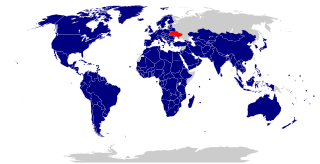
Ukraine has formal relations with many nations and in recent decades has been establishing diplomatic relations with an expanding circle of nations. The 'foreign relations of Ukraine are guided by a number of key priorities outlined in the foreign policy of Ukraine.

The Euro-Atlantic Partnership Council (EAPC) is a post–Cold War, North Atlantic Treaty Organization (NATO) institution. The EAPC is a multilateral forum created to improve relations between NATO and non-NATO countries in Europe and Central Asia. States meet to cooperate and discuss political and security issues. It was formed on 29 May 1997 at a Ministers’ meeting held in Sintra, Portugal, as the successor to the North Atlantic Cooperation Council (NACC), which was created in 1991.
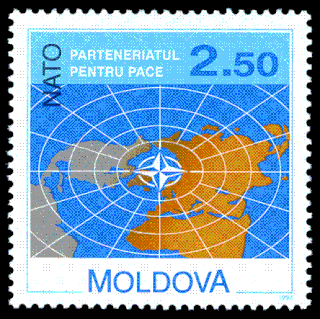
The Partnership for Peace (PfP) is a North Atlantic Treaty Organization (NATO) program aimed at creating trust between the Member states of NATO and other states in Europe, including Post-Soviet states; 20 states are members. The program contains six areas of cooperation, which aims to build relationships with partners through military-to-military cooperation on training, exercises, disaster planning and response, science and environmental issues, professionalization, policy planning, and relations with civilian government.

Transnistria, officially the Pridnestrovian Moldavian Republic (PMR), is an unrecognised breakaway state internationally recognised as part of Moldova. Transnistria is mostly located in most of the narrow strip of land between the Dniester river and the Moldovan–Ukrainian border, although it also controls land on the river's other bank. Its capital and largest city is Tiraspol. Transnistria has been recognised by only three other unrecognised or partially recognised breakaway states: Abkhazia, Artsakh and South Ossetia. Transnistria is officially designated by the Republic of Moldova as the Administrative-Territorial Units of the Left Bank of the Dniester or as Stînga Nistrului under Russian military occupation.
European integration is the process of industrial, economic, political, legal, social and cultural integration of states wholly or partially in Europe or nearby. European integration has primarily come about through the European Union and its policies.

Borys Ivanovych Tarasyuk is a Ukrainian politician who twice served as the Minister for Foreign Affairs of Ukraine and a former MP who is since December 2019 Ukraine's permanent representative to the Council of Europe.
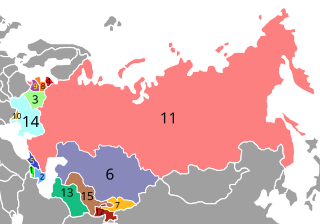
The post-Soviet states, also known as the former Soviet Union (FSU), the former Soviet Republics and in Russia as the near abroad, are the 15 sovereign states that were union republics of the Soviet Union; that emerged and re-emerged from the Soviet Union following its dissolution in 1991.

Founded in 1955, the NATO Parliamentary Assembly serves as the consultative interparliamentary organisation for the North Atlantic Alliance. Its current President is Gerald E. Connolly from the United States, elected in 2019. Its current Secretary General is Ruxandra Popa; she has been in this position since January 2020.

The Transnistria conflict is an ongoing frozen conflict between Moldova and the unrecognized state of Transnistria. Its most active phase was the Transnistria War, which ended in a Transnistrian victory. There have been several attempts to resolve the conflict, although none have been successful. The conflict may be considered as having started on 2 September 1990, when Transnistria made a sovereignty declaration from Moldova.
The 2006 Transnistrian customs crisis started on March 3, 2006, when Ukraine imposed new customs regulations on its border with Moldova on the Transnistrian region by declaring that it will only import goods from Transnistria with documents processed by Moldovan customs offices, as part of the implementation of a joint customs protocol between Ukraine and Moldova on December 30, 2005.

The 2004 Istanbul summit was held in Istanbul, Turkey from 28 to 29 June 2004. It was the 17th NATO summit in which NATO's Heads of State and Governments met to make formal decisions about security topics. In general, the summit is seen as a continuation of the transformation process that began in the 2002 Prague summit, which hoped to create a shift from a Cold War alliance against Soviet aggression to a 21st-century coalition against new and out-of-area security threats. The summit consisted of four meetings.

Poland–Ukraine relations as international relations were revived soon after Ukraine gained independence from the Soviet Union in the early 1990s. They have been both improving and deteriorating since. Various controversies from their shared history occasionally resurface in Polish–Ukrainian relations, but they tend not to have a major influence on the bilateral relations of Poland and Ukraine.

NATO is a military alliance of twenty-eight European and two North American countries that constitutes a system of collective defense. The process of joining the alliance is governed by Article 10 of the North Atlantic Treaty, which allows for the invitation of "other European States" only, and by subsequent agreements. Countries wishing to join must meet certain requirements and complete a multi-step process involving political dialogue and military integration. The accession process is overseen by the North Atlantic Council, NATO's governing body.
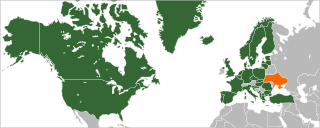
Relations between Ukraine and the North Atlantic Treaty Organization (NATO) started in 1992. Ukraine applied to integrate with a NATO Membership Action Plan (MAP) in 2008. Plans for NATO membership were shelved by Ukraine following the 2010 presidential election in which Viktor Yanukovych, who preferred to keep the country non-aligned, was elected President. Amid the Euromaidan unrest, Yanukovych fled Ukraine in February 2014. The interim Yatseniuk Government which came to power initially said, with reference to the country's non-aligned status, that it had no plans to join NATO. However, following the Russian military invasion in Ukraine and parliamentary elections in October 2014, the new government made joining NATO a priority. On 21 February 2019, the Constitution of Ukraine was amended, the norms on the strategic course of Ukraine for membership in the European Union and NATO are enshrined in the preamble of the Basic Law, three articles and transitional provisions.
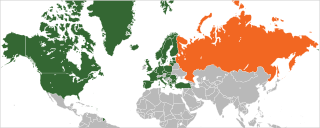
Relations between the NATO military alliance and the Russian Federation were established in 1991 within the framework of the North Atlantic Cooperation Council. In 1994, Russia joined the Partnership for Peace program, and through the early-2010s, NATO and Russia signed several additional agreements on cooperation.

The foreign policy of Ukraine is the strategic approach Ukraine takes to its relations with foreign nations, cooperation with international organizations, promotion of its national interests and protection of the rights of its citizens and diaspora abroad.

NATO maintains foreign relations with many non-member countries across the globe. NATO runs a number of programs which provide a framework for the partnerships between itself and these non-member nations, typically based on that country's location. These include the Euro-Atlantic Partnership Council and the Partnership for Peace.
The future enlargement of the Eurasian Economic Union is theoretically open to any of the Post-Soviet states and potentially any country of Europe or Asia. In order to accede, a state must fulfill certain economic and political requirements. Enlargement of the Union is also subject to the consent of all existing members and the candidate's adoption of existing EEU laws and implementing previous decisions made by the Eurasian Economic Commission. The present agenda of the enlargement of the Eurasian Economic Union is primarily focused on Tajikistan. Meanwhile, Moldova was granted Observer Status in April 2017, followed by Uzbekistan and Cuba in December 2020. The process of enlargement is referred to as Eurasian integration or Eurasianism. This term is also used to refer to the intensification of economic cooperation between Eurasian Economic Union member states.

Moldova–Transnistria relations are the political and economic relations between the Republic of Moldova and Transnistria, an unrecognized state between the Dniester River and Ukraine. During the dissolution of the Soviet Union, political tensions in the Moldavian Soviet Socialist Republic led to Transnistria declaring independence from Moldova, culminating in the Transnistrian War of 1992. As part of the ceasefire agreement ending the war, a Joint Control Commission composed of Moldovan, Transnistrian, and Russian forces was established to supervise the demilitarized zone which was located in the Transnistrian region. The Joint Control Commission still supervises the zone, and negotiations to resolve the dispute are ongoing. The negotiations are supported by the Russian Federation, Ukraine, the United States, the European Union, and the Organization for Security and Co-operation in Europe (OSCE).
















